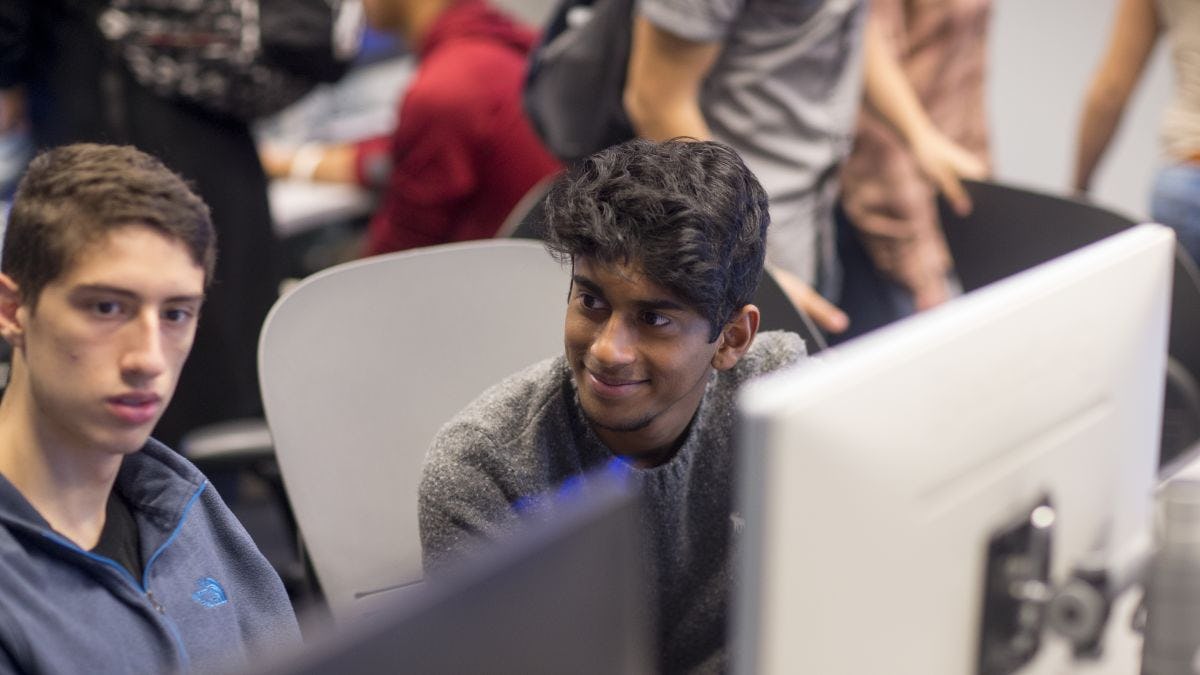
Bachelor's in Quantitative Social Science
Program Details
Degree
Bachelor of ScienceAvailable
On campusFrom Numbers to Knowledge, From Insight to Action
By combining computational techniques with social inquiry, Stevens’ quantitative social science major prepares students for data-driven decision-making.
Housed in the School of Humanities, Arts and Social Sciences, this Bachelor of Science degree trains students in analytical methods that drive contemporary research. While pursuing concentrations in political science, psychology or sociology, students gain skills invaluable to the modern workforce: statistical modeling, causal inference, forecasting, text analytics, social network analysis and experimental methods.
Catalyze Career Success
The quantitative social science degree at Stevens trains students to apply data analysis and research methods to real-world challenges. With concentrations in political science, psychology and sociology, graduates gain the skills to analyze human behavior through a multidisciplinary lens and build meaningful careers in research, policy and data-driven fields.
Professional Pathways in Quantitative Social Science
The demand for graduates with training in quantitative social science is reflected in current job postings. Recent listings on Indeed.com highlight roles that call for a bachelor’s degree in quantitative social science, demonstrating the relevance of this program in today’s workforce.
Research Associate, Brown University
Rotational Associate, D.E. Shaw
Researcher, M. Davis & Co.
UX Researcher, Meta
Data Science Development, Moody’s
Intelligence Analyst, NSA
Product Policy Analyst, TikTok
Internships and Continuing Education
Below are internships held by students in the QSS program, along with a continuing education outcome secured by a recent graduate.
Technical Writing Intern, Active Solar USA
Judicial Intern, Morris County Courthouse
Intern, NYC Department of Parks and Recreation
J.D. Student, Seton Hall University School of Law
Tech-Powered Curriculum
See the world through data. As a student in the quantitative social science major, you'll learn to analyze complex social issues, translate data into meaningful insights and develop skills that set you apart in an increasingly analytical world.
Over the semesters, the program sharpens students’ analytical skills, preparing them to tackle complex social challenges with quantitative methods. The curriculum spans probability, statistics, research methods and data storytelling, blending theory with hands-on application.
What are concentrations?
Students pursuing a Bachelor of Science in Quantitative Social Science at Stevens select a focus area within the program to deepen their expertise. This focus allows students to specialize in areas such as data analysis, statistical modeling and research methods, equipping them with advanced skills to address complex social issues.
Political Science Concentration
The political science concentration prepares students for roles in industry, government and academia that require knowledge of data collection and statistical analysis. Students will learn to pose questions, design research and analyze information about political problems.
In the political science concentration, you’ll take dynamic courses that explore critical aspects of governance and civic engagement:
The U.S. Congress
Public Policy Analysis
Campaigns and Elections
Identity Politics and Legal Theory
Health Politics
Political Theory
International Politics
Sociology Concentration
Students in the sociology concentration collect and analyze data on a wide range of social issues, whether big or small, visible or hidden. Analytical tools enable students to discover the hidden details of social processes, derive insights about broad populations and offer informed policy recommendations.
In the sociology concentration, you’ll take diverse courses that examine the complexities of social structures and cultural dynamics:
Sociology of Globalization
Sociology of Science and Technology
Comparative Ethnic Culture
Sociology of Gender
Cultural Anthropology
Social Choice Theory
Computers and Society
Modern Urban Culture
Psychology Concentration
Psychology students use quantitative skills to research individual human behavior and mentalities. By measuring emotional and mental constitutions with precision and depth, students develop a profound understanding of the human psyche.
In the psychology concentration, you’ll take courses that investigate the intricacies of human behavior and mental processes:
Fundamentals of Psychology
Social Psychology
Developmental Psychology
Biological Psychology
Health Psychology
Psychology of Prejudice
History of Psychology
Theories of Personality
What is a senior thesis?
The culmination of a student's academic experience at Stevens, the thesis is a significant piece of original research designed and executed under the direction of a faculty advisor. Students contribute to academia’s existing body of knowledge, becoming scholars in their own right.
HASS thesis writers present their findings at the annual Innovation Expo, celebrating their intellectual curiosity and hard work.









